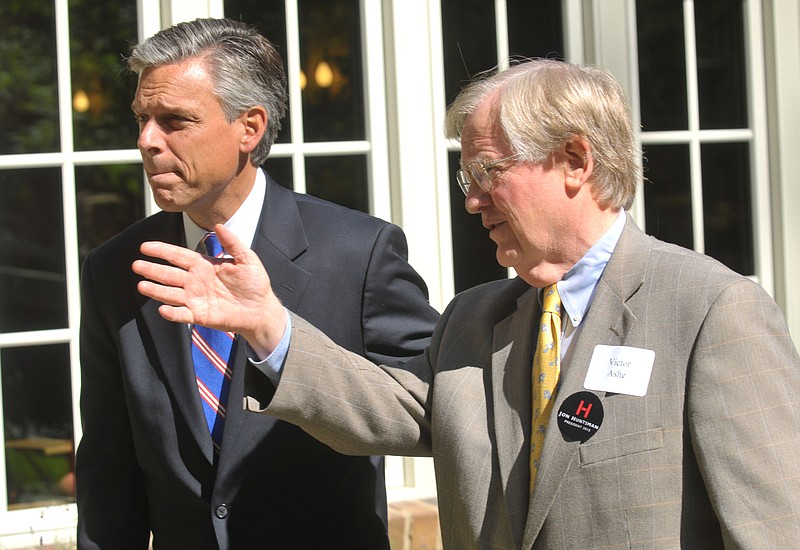Victor Ashe was running for his second term in the Tennessee House of Representatives in 1970, but he also kept one eye on the state's competitive races for governor and United States senator.
That year, now 48 years in the rear-view mirror, may most closely resemble this one in having both a Republican gubernatorial primary candidate who is likely to win with only a plurality of votes and a U.S. Senate general election campaign that could be a nail-biter.
Ashe, 73, who since then has been a state senator, Knoxville mayor and ambassador to Poland, said the 1970 Republican gubernatorial primary did not have the forums or debates that this year's race seems to have at least weekly.
"I don't recall many," he said. "Debates hadn't achieved the popularity they have now. Today, it's sort of a given."
As of 1970, the last presidential debate had been between John F. Kennedy and Richard M. Nixon in 1960. The next one, between President Gerald Ford and former Georgia Gov. Jimmy Carter, wouldn't be until 1976.
Even having a primary for Republicans was pretty novel, Ashe said.
When Howard Baker was elected to the U.S. Senate in 1966, according to the online Knoxville Focus, 17 counties still didn't hold a Republican primary.
If you wanted to vote for Baker or his opponent, Ken Roberts, "you were out of luck," Ashe said. "But that changed pretty quickly."
Indeed, the 1970 Republican gubernatorial primary, as in 2018, had four main candidates, Memphis dentist Winfield Dunn, business executive Maxey Jarman, state House Speaker Bill Jenkins and GOP state party chairman and Knoxville attorney Claude Robertson.
Unlike this year, when all four candidates are millionaires, only Jarman was well-heeled. Dunn, the eventual winner of the primary and general election and Tennessee's first Republican governor in 50 years, "didn't personally have great wealth," Ashe said. "He could raise money in Nashville, but there were not that many votes there."
In 2018, he said, some of the gubernatorial candidates have been running for two years. Dunn, in 1970, began his primary campaign in April.
Jarman, according to Ashe, had the most money and the most advertising in the primary.
"[The former Genesco executive] was a successful businessman," he said. "If that appealed to you, he was your candidate."
Ashe supported Robertson, who had run Baker's 1966 campaign, but he found little support outside Knoxville.
"But Winfield came out of nowhere," he said. "He was an incredibly charismatic individual; he took charisma to a new level. He was tall, good looking. If you were with him, you felt you were the only person on his mind. He had a great way about him."
Ashe said he wasn't sure if anyone can repeat Dunn's formula this year. The campaign appears to be between U.S. Rep. Diane Black and Knoxville businessman Randy Boyd, he said. Nashville businessman Bill Lee is "making some progress," Ashe said. House Speaker Beth Harwell is likely to finish fourth, he said.
Where Dunn won the 1970 primary with only 33.26 percent of the vote, the winner this August "will hit about 40 percent," he speculatied. Where Jarman had nearly 29 percent, Jenkins nearly 21 percent and Robertson 16.5 percent, 2018 "won't be as neck and neck by [primary] Election Day."
Tennessee's U.S. Senate race in 1970 had a Democratic incumbent (Albert Gore Sr.) who was, according to Ashe, thought to be "out of touch, too close to the Kennedys, on the liberal end of the Democratic Party." That's not how [2018 Democrat Senate candidate Phil] Bredesen is viewed, he said.
Gore was opposed by four-term U.S. Rep. Bill Brock of Chattanooga, while Bredesen is opposed by eight-term U.S. Rep. Marsha Blackburn of Brentwood.
In 1970, Ashe said, Brock began in front but saw his lead narrow. He eventually won with 51.29 percent of the vote. The Bredesen-Blackburn race, he said, "will be close, very competitive. [President Donald] Trump didn't come here to celebrate a 20-point lead. In fact, he told everyone how close it was.
"No question," he said, "it will go down to the wire."
Many things, including the proliferation of the forums, have changed in elections since 1970, Ashe said.
"The notion that you would put the Democrats together with the Republicans [on the same dais] is new this year, he said.
Advertising also has changed, he said. So much more money is spent on it, and it can be targeted to the individual demographic the candidate wants to reach.
Republican candidates in particular, compared to 1970, have a wider audience to play to, Ashe said. That year, he said, the notion that the Nashville bedroom counties of Wilson and Sumner would turn out for Republicans "was fiction." But in 2016, those counties gave Trump the seventh and ninth highest county totals he received in the state.
In 2018, he said, candidates also can reach out to younger voters (the 26th Amendment to the Constitution gave 18-year-olds the right to vote in 1971), and most voters have the opportunity to vote early.
So while the Republican gubernatorial primary and general election Senate race may have echoes of 1970, the political playing field has shifted and shifted and shifted again in the last 48 years. But competition has not changed. The candidates don't want the jobs any less.
